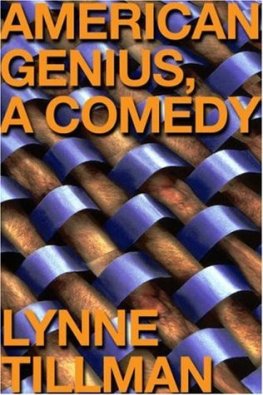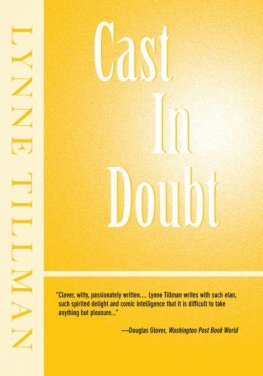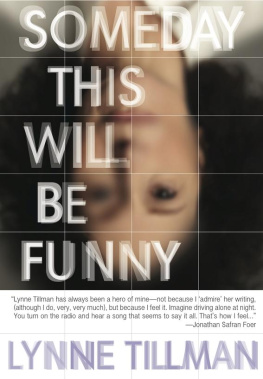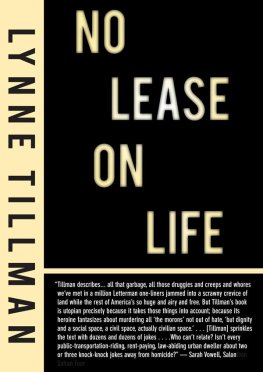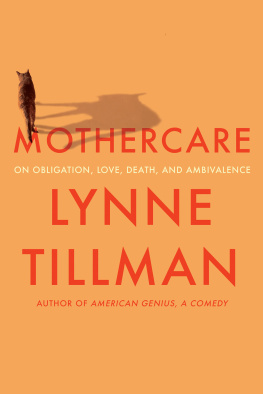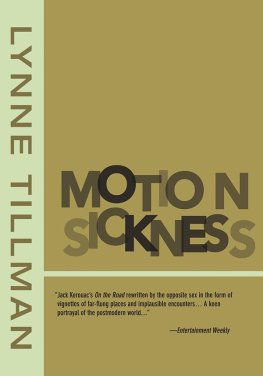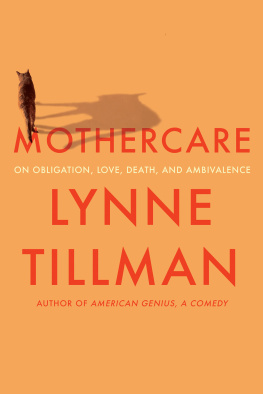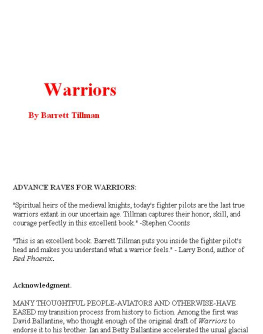Lynne Tillman
American Genius: A Comedy
For Joe Wood
19651999
Unforgettable
Life is unfair. Some people are sick, and others are well.
President John F. Kennedy, 1962
Woe to him whose beliefs play fast and loose with the order which realities follow in his experience; they will lead him nowhere or else make false connexions.
William James
The food here is bad, but every day there is something I can eat and even like, and there's a bathtub, which I don't have at home. I can have a bath here every day before dinner, which is at 7:30 p.m. and usually unsatisfying. But I can't wait for dinner because it's the official end to my day, and there will be other people around with whom I can talk and who may distract me. I'm often distracted from the things I must do, which I feel compelled or expected to accomplish. But here I hope to discover what might help me or what I need to know, or what I don't need to know, for instance, about the other residents in the community.
Sometimes I have a chance to have a bath before dinner. I eagerly undress and fill the old-fashioned, footed bathtub with very hot water, pour bath oil under the faucet, three capfuls which is supposed to invigorate your body, moisturize your skin and soothe your mind, and though this never happens, my mind is never soothed, I still liberally pour in bath oil that claims to soothe the mind and help the skin. My skin is dry during the winter and also during the summer, it is dry the year long, I have very sensitive skin, which is what the Polish woman at home who gives me a facial every two months tells me, repeating each time I have a facial, Your skin is very sensitive, probably because we don't have much else to talk about. We don't have much in common, but I hear stories about her life and know she was once married, and that she now goes on dates with men and on trips and outings with girlfriends.
One day while I was having a facial in the salon, a dignified word for the cramped, dingy space, the doorbell rang and she answered it. She is the only one working there, except on weekends, when the owner, an attractive woman who takes good care of herself and has two children and a husband, works, too. The woman who gives me facials doesn't have a husband and children but would like to. She is also attractive and takes good care of herself, and works five days a week. At the door was the man she was just telling me about, who was pursuing her and asking her for dates, which she declined, putting him off evasively. He entered the cramped space.
When the Polish woman, known professionally as a cosmetician and beautician, had finished cleaning my pores and moisturizing my sensitive skin, he was still there, waiting, crudely handsome and glowering, sitting on an ugly plastic-covered chair near the table with out-of-date beauty magazines. I glanced at him, someone I knew slightly, but didn't remember how, which is often the case, many faces are unbearably familiar and indistinct, so it was embarrassing, because he was waiting for her, and I shouldn't have seen him in this setting, when she didn't want to date him or maybe ever get married or perhaps couldn't, because she took care of her mother, or she's too picky or because she doesn't really like men. Probably I should have warned her that he was not a good man, it was easy to see, because why else would he surprise her, coming unannounced and perhaps unwanted to her place of work, where she was supposed to be safe from such incidents, but I didn't, because people, women especially, like to hear they have sensitive skin or that they are sensitive. It supposedly distinguishes them from animals who are not sensitive in the way that human beings apply the word. An animal's skin is usually not sensitive, though I have a friend whose cat has sensitive skin; it often has sores at its mouth and is allergic to many kinds of food, and my cat, the one I put to sleep because it stalked me, had dry skin and dandruff. Animals and some men are predatory, though female cats make better hunters. People are strange about their animals. I like animals, especially cats and dogs, birds, too, and I am often disturbed about the fate of animals, though I eat meat, fish, and fowl, and don't appreciate the audible disdain or silent criticism of a few self-righteous vegetarians who sometimes sit at my dinner table here. Two dogs nearly killed one of the kittens our family cat gave birth to, nearly tore it in two, but my mother rescued it and carried it to the vet, where it was sewn up and lived. My mother loved our family cat, then she gave it away after it decapitated and ate my bird, and neither of us, her two children, was able to forget the terrible fate of our cat, certainly not I, even now that my mother's brain is damaged. No one brings it up, not anymore, though when my mother talks about the family cat now and how much she loved her, how special the cat was, I avert my eyes, I look down, I have to, because otherwise I might shout, You killed the cat.
Before I arrived here, a tarot cardreader, whose predictions I would ordinarily dismiss, since I believe only the past can be read, though it is also unknowable, but who struck me as unusually astute, predicted that I would meet an obstacle or person who would forever change my life. My cards were powerful, he said, which I heard with incredulity, though, as he spoke, it occurred to nee that it didn't matter what I believed of his philosophy, since the notion had already taken hold, one that might come to my aid, a placebo, or one I wanted to accept, since belief is important, everything, and also nothing much, an attachment like a skein of froth. About the prediction, I told no one, and my life did change, but not in the way the cardreader foresaw.
My parents gave away my dog, because they said they couldn't take care of her, but I didn't believe them. I should have saved my dog, who was devoted and good, and never hurt anyone, except maybe a plumber. When I left home at eighteen, thrown out by my parents, which had consequences for the future I didn't consider then, a plumber came to the apartment where I stayed for a time with friends to fix the toilet, when only I was there, and because my dog was nervous and scared, protecting me in a strange, new place, she hit the plumber on his calf. He couldn't be reassured she wasn't rabid. The next day a policeman came to the door and served a summons, legally compelling me to bring my dog to the ASPCA, to a division called BITES, where my dog had to be examined, the smallest dog in an ugly office, obviously not rabid, terrified of the bigger, growling dogs near her, and it was after that I gave my dog back to my parents, because I couldn't take care of her. She couldn't live in an apartment, having been raised in a house with a lawn in a neighborhood where she was able every morning to go for walks around town with her best friend, Pepe, a standard black poodle, one of the two dogs who had mauled and nearly killed the kitten, but that was long ago and forgiven because the kitten lived and Pepe was such a good friend to our dog, even though he once bit her on the genitals and she had to go to the dog and cat hospital.
When Pepe came to take her for a walk around town the next morning and she wasn't there, he refused to leave the house until my mother opened the door and let him search for her, and only then, after he'd gone upstairs and downstairs and into the basement, only then, when he didn't find her, did Pepe go home. I gave my dog to my parents for safekeeping, until I could take care of her, because in the winter, when there's snow on the ground, my dog couldn't go for a walk on a leash since the City salts the sidewalks with minerals that hurt dogs' paws, and walking, she whimpered and yelped, and I had to carry her to a place where she could be set down to piss and shit, and after she did, I would have to carry her again. I gave her to my parents, then my parents gave her away, had her killed, though they insisted someone adopted her, after they lied about her ageshe was eight, but looked younger, my father contended-so she was adopted under false pretenses, and neither of us children ever believed the story, that she had been adopted, that she had not been killed, but there was nothing to do, it was too late, she was gone.

